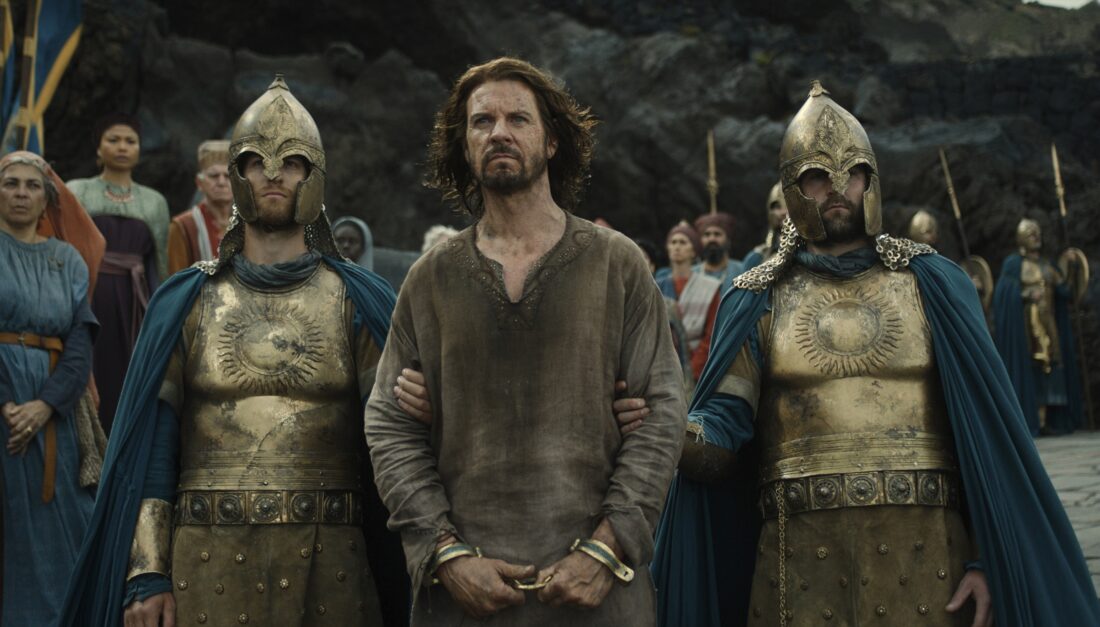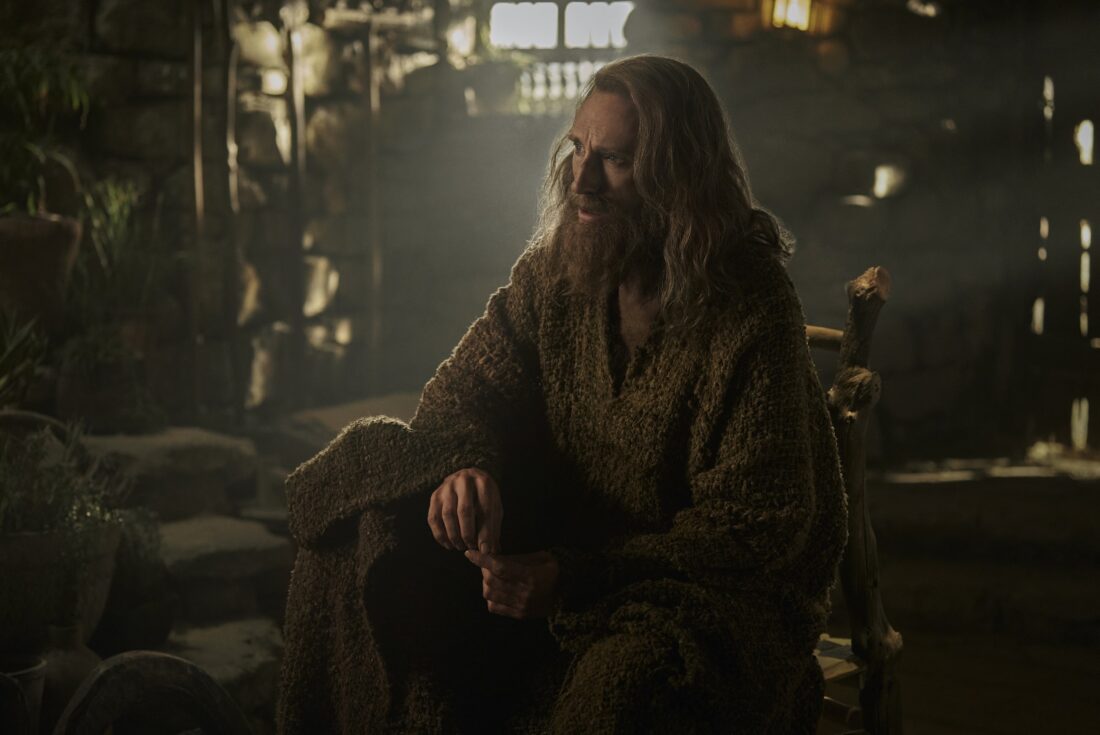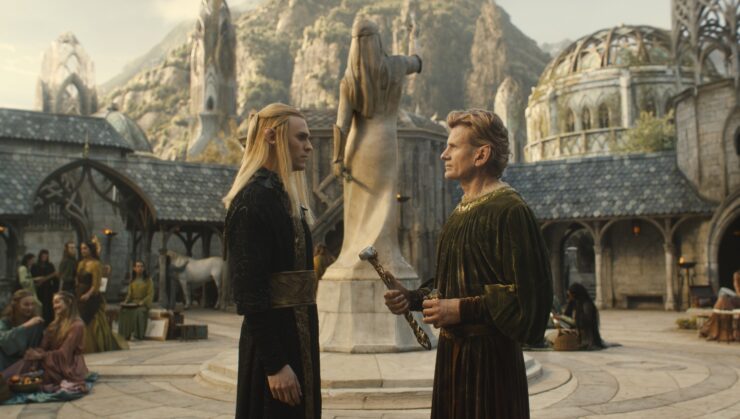Episode six, “Where Is He?” opens with Arondir tracking Adar’s army. He finds a map on an orc he has killed. In Eregion, Celebrimbor is frustrated in his attempts to forge the rings for men, and suffering from lapses in his memory. Annatar takes over the administrative duties of Eregion. The elves find the body of a soldier, who has “Where is he?” in orcish writing carved into his chest. Mirdania wants to tell Celebrimbor, but Annatar says that no one is to disturb him. Adar insists that he can help Galadriel destroy Sauron for good, suggesting that Morgoth’s crown could be paired with the power of Galadriel’s ring to truly destroy him forever. He has figured out that Halbrand is Sauron, and asks Galadriel to put aside her pride to save Eregion.
Pharazôn presides over Elendil’s trial. He offers to commute the death sentence if Elendil renounces his crimes and swears allegiance to Numenor’s true king. Elendil declares that Miriel will always be Numenor’s true ruler. Pharazôn’s advisor suggests that they “let the Valar decide” Elendil’s fate. The Stranger has a vision of Nori in trouble, and Bombadil tells him that the secret fire can show him things, if he learns to listen. The Stranger wants to master the secret fire and use it as a weapon, and Bombadil scornfully tells him that he has failed every trial he has encountered thus far, but if he fails this one, there will not be another. Nori considers turning herself in to the riders to protect the Stoors. Poppy and Merimac share a romantic moment. Later, Poppy reminds Nori that the riders are after the Stranger, and that Nori turning herself in might put the whole world at risk.
Bombadil leads the Stranger to a place where there are many dead trees, and tells him that he will find his staff only when he is focused solely on the goal of serving the secret fire. The Stranger knows that Nori and Poppy will die if he doesn’t go to them, but Bombadil tells him that if he leaves now, he can never return to seek his staff. He tells the Stranger that he can choose his friend, or his destiny, and then disappears. In Khazad-dûm, the dwarves are hard at work in the mines and forges. Annatar comes to King Durin and his son to ask for more mithril, offering the timber needed for mining in exchange. Durin IV is surprised when his father refuses Annatar, and relieved, until the King tells his son that he intends merely to wait the elves out—they will need mithril armor for the coming war, and then the dwarves can name any price they want. Again Durin IV tries to get his father to take off the ring—when he tries to pull it off Durin’s finger, the king throws him away with supernatural force.
In their rooms, Disa is determined to do whatever it takes to show the other dwarves that Durin III is no longer fit to rule. Durin IV can’t stand the thought of humiliating his own father, who is still there somewhere behind the ring’s influence, but Disa argues that unless they act, that bit of Durin will be destroyed, and the kingdom with him. Eärien visits her imprisoned father, begging him to accept Pharazôn’s offer of mercy, before he is thrown into the sea to face Trial by Abyss. He refuses, but Eärien has brought Míriel to speak to him. She commands him to bow to Pharazôn, but Elendil still refuses, and tells her that if it is the will of the Valar that his life be spared, then it will be. Narvi and some of the miners encounter Disa blocking their path. They intend to move her by force, but her singing brings giant bats which drive the men away. Durin emerges from out of sight, impressed and declaring his love for his wife.

Elendil is about to be thrown into the sea to face the judgment of the Valar, but Míriel demands to take his place. By the letter of the law, Pharazôn has no choice but to accept, and Miriel is led down to the water. A giant tentacle drags her under the surface, and she faces a huge creature. Then she is returned to the surface, an act which proclaims that the Valar have found her innocent. Elendil leads a cheer for Tar Miriel, Queen of the Sea, and all the people take it up. Pharazôn consults the palantir, seeing a vision of fire and Halbrand’s face.
Galadriel tells Adar about the rings, and that Elrond has her ring, Nenya. She suggests that once the Lindon army has taken Eregion, she and Adar can be there to defeat Sauron. He replies that she has told him everything he needs to know, and reveals the true size of his orcish army. Galadriel realizes that this must be what Sauron wants. She is dragged away, begging Adar not to let Sauron manipulate him. In Eregion, they hear the sounds of Adar’s army approaching, and Sauron stands at a window, cutting his hand with a blade.
Celebrimbor is working feverishly over designs for the nine rings. When he hears the sounds outside he goes to check, despite Annatar’s protests. But Sauron uses his power to make Celebrimbor see everything as normal. He presents Celebrimbor with a vial of powdered mithril, and promises that the rings of power will one day be the most precious things in Middle-earth. The illusion fades once Celebrimbor has gone back inside, and the attack on Eregion begins.

It’s difficult to review this episode, because it has the same strengths and the same weaknesses as the episodes that came before last week’s. The scenes between Disa and Durin, and between Durin and his father, remain the best executed, while those with Galadriel and Celebrimbor are clearly trying to do something equally profound but can’t quite manage it. And then there is the storyline with Elendil, Míriel, and the fate of Númenor, which is actually pretty riveting—except for the fact that the show fails to establish certain details that are needed to make the story effective.
Perhaps the most egregious, in my eyes, is the character of Eärien, who was barely shown in season one and now has a very significant role in Pharazôn’s court. Her conversation with Elendil, in which she fears losing her father as she lost her brother and begs him to swear his allegiance should be heartbreaking, but all we know about her is that she blames Míriel for Isildur’s death, and went so far as to conspire with Pharazôn against her rule. I think the point is also supposed to be that she was genuinely shaken by her discovery of the palantir and Míriel’s use of it, but it really only comes off that she would say anything to punish the queen for Isildur’s death. I have no reason to think that she believes in what she’s doing, and as a result, her plea to her father feels selfish, rather than heartfelt.
On the other hand, when she asks Elendil to swallow his pride, his response to her comes off equally badly. He tells her that if she believes his actions are about pride, then there is nothing more they can say to each other, and it comes off as impossibly cruel given that they have never actually had a real conversation in which Elendil explains his beliefs, or tries to understand hers. This conversion in his cell is merely a more dramatic rehashing of the argument they had when the Sea Guards were being dismissed, and Elendil seems to have written his daughter off impossibly easily. He is willing to fight for what he believes in, he is willing to fight for, and with, Míriel—to listen to her perspective and try to understand, even though he can’t ultimately do as she asks. But with Eärien, he seems to dismiss her the moment she doesn’t agree with him. And I find myself wondering if he ever cared about his daughter at all, or if she ranks so low on his list of priorities that he has no time to spare for her when he’s busy nobly dying for what he believes in. It is impressive, somehow, that neither character comes off sympathetically when I think the show intends them both to.
The way the narrative handles Míriel is also disappointing—she has the basics of a great character but the journey they started to give her in season one has been cast aside in favor of giving the struggle to Elendil, which is a mistake from a storytelling perspective, and also means that this important journey was taken away from a Black woman and given to a white man. Elendil is, of course, a big name in Tolkien’s work—his name is even born by the star whose light Galadriel gifts to Frodo in The Fellowship of the Ring—so one presumes this is why he has become the focal point of the conflict in Númenor. But there’s really no other reason for it. It should be Míriel’s journey, and if the conflict with Elendil’s inability to submit to Pharazôn’s rule had been presented from her perspective, then her decision to take his place in the Trial of the Abyss would have been much more poignant and powerful, a choice that belonged to her, rather than one it feels like Elendil pushed her to because of his “nobler” heart.
The decision to blind Míriel at the end of the last season is a baffling one. It doesn’t add anything to her journey, and it’s troubling that the show seems to be trying to equate her loss of political power with the loss of her sight. Perhaps that is unintentional, but I can’t think why else the choice would have been made, and it only results in removing further agency from a character that the narrative is already treating poorly. Míriel’s blindness is depicted in a one-dimensional, ableist manner, with a sighted actress, and no attempt is made to deal with the reality of someone adapting to a new disability. It looks clumsy on screen.
One aspect of the story that I think is being handled really well is what the power of Durin’s ring looks and sounds like. It is necessary to code it enough like the One Ring to show the similarities, without making it exactly like the One, which is more powerful and more connected to Sauron’s influence. The other rings are supposed to corrupt, but they aren’t supposed to turn you into a weak version of Sauron, the way the One eventually does. The show has struck that balance well, but I’ve been worried that it will eventually make the similarities too blatant, or too corny. The moment when Durin III pushed his son did feel like too much, but other than that I think that the balance has been just right. Last week, Druin’s conversation with Narvi in which he panicked that Narvi had taken the ring was similar to the way Bilbo fussed over the location of his, without being identical. And when Durin IV asks his father to take the ring off, we again have something that is similar enough to chill the viewer, yet is also a moment that belongs to itself.
“Why should I?” Durin asks his son, “It is mine,” and for a moment I believed he would lapse into a recitation of “my own, my precious.” Instead, he finishes with, “it belongs to me,” and his son, with perfect grief in his voice, answers “No, you belong to it.”
It was, I think, the best moment in the episode, and possibly in the entire season.
There is an attempt within this season, and this episode in particular, to show a variety of characters struggling to decide whether to accept the advice of friends, loved ones, and allies or to trust their own instincts and desires. With Elendil, he is asked by Míriel to submit to Pharazôn as king, but he cannot bring himself to do it, because his own heart tells him that it is wrong. With Durin IV, he can’t bear the thought of humiliating his father, but accepts Disa’s advice when she insists that it is necessary, both for the king’s sake and their peoples’. Galadriel is persuaded to put aside her own instincts in regards to Adar, only to discover that he has tricked her, and that they are both playing into Sauron’s hands. And the Stranger is told by Bombadil that he must choose between saving his friends and fulfilling his destiny.
In theory, I don’t dislike that newborn Gandalf (we all know it’s Gandalf) is being given the Luke-in-Empire-Strikes-Back test. I imagine that his journey will be similar to the one given to Aang in Avatar: The Last Airbender, where it will appear at first that his love for others is a weakness he can’t afford, but in the end will be his true strength. I do, however, absolutely hate how it’s being presented.
I assumed, when we first met fallen-star Gandalf, that part of his journey would be rediscovering his identity as one of the Istari, that the memory loss was due to the shock of being incarnated in a living, mortal body. However, he is being presented more like someone just created, and the idea that this newborn being is constantly being tested and failing, pinocchio-style, is kind of grating. If this guy just arrived and has no idea who he is or who anyone else is, how is he supposed to make the right choices?
And whatever he’s being told and however he’s being judged, it shouldn’t be by Tom Bombadil? As I pointed out last week, they’ve just made Bombadil seem like another wizard, and the fact that he’s wise-guiding Gandalf the way Gandalf will go on to wise-guide Bilbo and Frodo is, if you’ll forgive an unprofessional turn of phrase, just dippy. They took what is arguably the most important and powerful quote from The Fellowship of the Ring—one in which Gandalf shapes the entire story thematically in a moment of candor with Frodo—and threw it away as something an out-of-character Tom Bombadil once said to him.
This is, as my spouse calls it, the prequel problem. In an effort to explain away who Gandalf was in The Lord of the Rings, an intricate part of him is dashed off as a quick one-liner. Gandalf’s speech to Frodo, his own impulse towards compassion and not to “deal out death in judgment”—when Gandalf is certainly powerful enough to do both—shows why he is the one Istar who succeeds when all the others fail. Sauron and Saruman succumb to the lure of power and lust for control over others, Radagast gets distracted by his own interests, which are not evil but aren’t what he was sent to Middle-earth to do. (And then there’s the other two Wizards whose fate was never disclosed but who certainly weren’t any help in the fights against Morgoth and Sauron.) It is easy to shorthand Gandalf’s identity with this line, and a few others Bombadil has delivered, but it cheapens it.
Bombadil’s constant references to “serving the secret fire” is another example of the same problem. This phrase is also used by Gandalf in his famous “you shall not pass” speech in The Fellowship of the Ring, in which he declares himself “a servant of the Secret Fire” also known as Eä, a somewhat undefined concept of the power of creation and existence. He was identifying himself as a servant of the Valar, and now the show is using that same phrase, but this time to suggest that Bombadil is teaching Gandalf how the world works, and how to access its hidden powers. It’s unclear whether Gandalf is meant to have known this and forgotten, or if this is new information he is gaining for the first time, but either way, the short-hand being used here is somehow both simplistic and yet unnecessarily vague at the same time.
It’s a real waste to bring in Tom Bombadil and not have him behave like Tom Bombadil. But it feels like the show didn’t know how else to progress Gandalf’s story without having someone to sit him down and explain everything to him, and to the audience. This is another moment where the show’s pacing is all over the palace: We had most of the encounter with Bombadil in episode four, then we had nothing in five, and now in episode six we briefly wrap it up with one scene that doesn’t actually add anything new to the questions Gandalf is facing, plus half a scene with Nori and Poppy that doesn’t do anything at all (although I admit that Poppy and Meridoc are very cute). It’s almost like the scenes are just dropped into the episode so we don’t forget they exist. Also, did Tom Bombadil just vanish at the end of that conversation, like a ghost? Or like Batman? That is so silly, and not in a good, Bombadil sort of way.
He could have just dropped that heavy choice in front of Gandalf and then gone skipping off singing, thank you very much.

Moments I enjoyed in episode six:
- Anatar’s fancy new robes. It’s a very George Lucas move to update his look from Jesus-chic to to this dark new outfit, with its slim silhouette and asymmetrical feathered shoulder that is vaguely reminiscent of armor. He is more secure in his power over Celebrimbor now, and close to achieving his goals, and showing that in his physical look is a really nice touch. It’s a more flattering outfit on Vickers’ as well, and even makes the wig look a bit more convincing. At least, when you don’t see it from the back, anyway.
- Arondir’s short but excellent fight scene. Arondir was my favorite character in season one, and although he’s been edged out by Disa, I really wish he was in season two more. I assume they’re just reminding us that he exists so he can come rescue Galadriel at a significantly dramatic moment.
- Adar’s description of Sauron’s influence on people was actually really good. I wish the show had been better at showing it to us, but I did enjoy the conversation between him and Galadriel about how they had both experienced his manipulation, particularly the way in which he makes others feel like his power is their own. Again, it’s using a single description, a single conversation, to do all the work that should be done over the course of the entire season, but it did help me understand how Sauron’s influence feels to those who experience it, particularly to Celebrimbor, so I appreciated its inclusion here.
- Celebrimbor’s very Shakespearean monologue to the rings, asking why they keep defying him. It doesn’t quite work because the language doesn’t fit the way anyone speaks at any other time in the show, but on its own it was kind of great.
Until next week…










